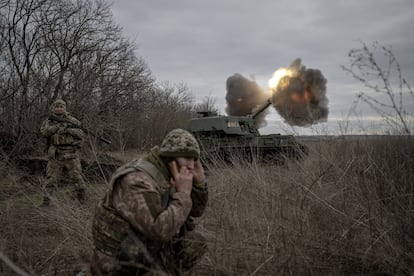Ukraine gears up military recruitment in war with Russia
A new bill lowers military service age, increases penalties for draft evasion, and mandates up-to-date military documents for citizens abroad


Ukraine is getting ready to expand its military recruitment efforts for its war with Russia. The Rada legislature is currently considering a bill proposed by President Volodymyr Zelenskiy’s administration to lower the military service age from 27 to 25; impose stricter penalties for draft evasion; and require Ukrainians living abroad to keep their military documents up to date.
At the end of its second year, the Russia-Ukraine battle is turning into a war of attrition, and President Zelenskiy recently announced that nearly 500,000 new recruits had been called up. Expanding military draft requirements will enable the country to press thousands of men (women are not part of the mobilization) into service. It has become a highly divisive issue for the country, and neither the government nor the army wants to bear the responsibility alone.
While Zelenskiy requests more munitions and weaponry from Western allies to bolster its air defenses, debate on the military recruitment bill is progressing in the Rada. Ukraine is a divided country: those near the frontlines and everyone else, where a sense of normalcy has set in. Many have lost the existential urgency that marked the war’s first year, and most Ukrainians who haven’t already enlisted no longer want to fight.
The proposal to ramp up mobilization efforts aims to balance Ukraine’s troop strength with that of Russia to some extent. Russia’s population is about 143 million, much larger than Ukraine’s 43 million (according to pre-war data). The Kremlin launched its first widespread mobilization campaign in September 2022, followed by subsequent reserve call-ups. It can also count on mercenary forces like Wagner, which was absorbed into the Russian Army followed the death of its leader, Yevgeny Prigozhin. Russia recently eliminated some illness-related military exemptions, and accelerated a citizenship path for foreigners who enlist in the military.
Friction between Zelenskiy and armed forces chief
Zelenskiy’s new measure has caused more friction with the commander-in-chief of Ukraine’s Armed Forces, Valerii Zaluzhnyi, who stressed the need for more recruits but opposed announcing specific targets. Zaluzhnyi argues that recruitment targets reveal casualty figures and overall troop strength. Analysts estimate that the Ukrainian forces are approximately one million, but they caution that this estimate from the early stages of the large-scale war is outdated.
Many soldiers have been fighting on the front lines without a break for months. “We’re tired, and I think we need more people, but I don’t believe in forcing things,” said Andrei, a soldier deployed to the Kharkov front. “This takes motivation, otherwise, it just won’t work. But we need more people in many different positions.” The recruitment and demobilization of long-serving combatants has sparked protests by the wives and families of these soldiers. Every Saturday, dozens gather in downtown Kyiv demanding that everyone “share the responsibility.”
Under the current law, there is no maximum period for mobilization during martial law, which was declared by Zelenskiy on the first day of the war. Ukraine’s martial law also prohibits males of draft age from leaving the country. The new bill sets a maximum service period of 36 months, but Zaluzhnyi warns that demobilization is contingent on no battlefield escalation and Ukraine having ample numbers of reservists.
The recent corruption cases involving military officials charged with accepting bribes to help men avoid the draft and manipulate paperwork are also discouraging recruitment efforts. The new bill enables recruitment offices to send notifications via email and other electronic platforms. Currently, notifications are sent to the last known address; however, there have been controversial instances where they were delivered in person on the street.
The bill also requires Ukrainian citizens living abroad to present valid military documents to obtain a passport or other consular services. Furthermore, those who evade conscription could face up to five years in prison and potential loss of social welfare benefits.
The White House recently reported that Russia used short-range ballistic missiles from North Korea in its massive airstrikes against Ukraine in early January. National Security Council spokesperson John Kirby called the weapons transfers — documented by U.S. intelligence — a “significant and concerning escalation.” Moscow and Pyongyang have denied any arms agreements. Russia used multiple North Korean missiles in a large-scale attack on January 2 mostly targeting Kyiv and Kharkov, said Kirby, who claimed that the Kremlin also plans to acquire missiles from Iran. Tehran already supplies Moscow with military drones, which have been used extensively against Ukraine.
Sign up for our weekly newsletter to get more English-language news coverage from EL PAÍS USA Edition
Tu suscripción se está usando en otro dispositivo
¿Quieres añadir otro usuario a tu suscripción?
Si continúas leyendo en este dispositivo, no se podrá leer en el otro.
FlechaTu suscripción se está usando en otro dispositivo y solo puedes acceder a EL PAÍS desde un dispositivo a la vez.
Si quieres compartir tu cuenta, cambia tu suscripción a la modalidad Premium, así podrás añadir otro usuario. Cada uno accederá con su propia cuenta de email, lo que os permitirá personalizar vuestra experiencia en EL PAÍS.
¿Tienes una suscripción de empresa? Accede aquí para contratar más cuentas.
En el caso de no saber quién está usando tu cuenta, te recomendamos cambiar tu contraseña aquí.
Si decides continuar compartiendo tu cuenta, este mensaje se mostrará en tu dispositivo y en el de la otra persona que está usando tu cuenta de forma indefinida, afectando a tu experiencia de lectura. Puedes consultar aquí los términos y condiciones de la suscripción digital.








































